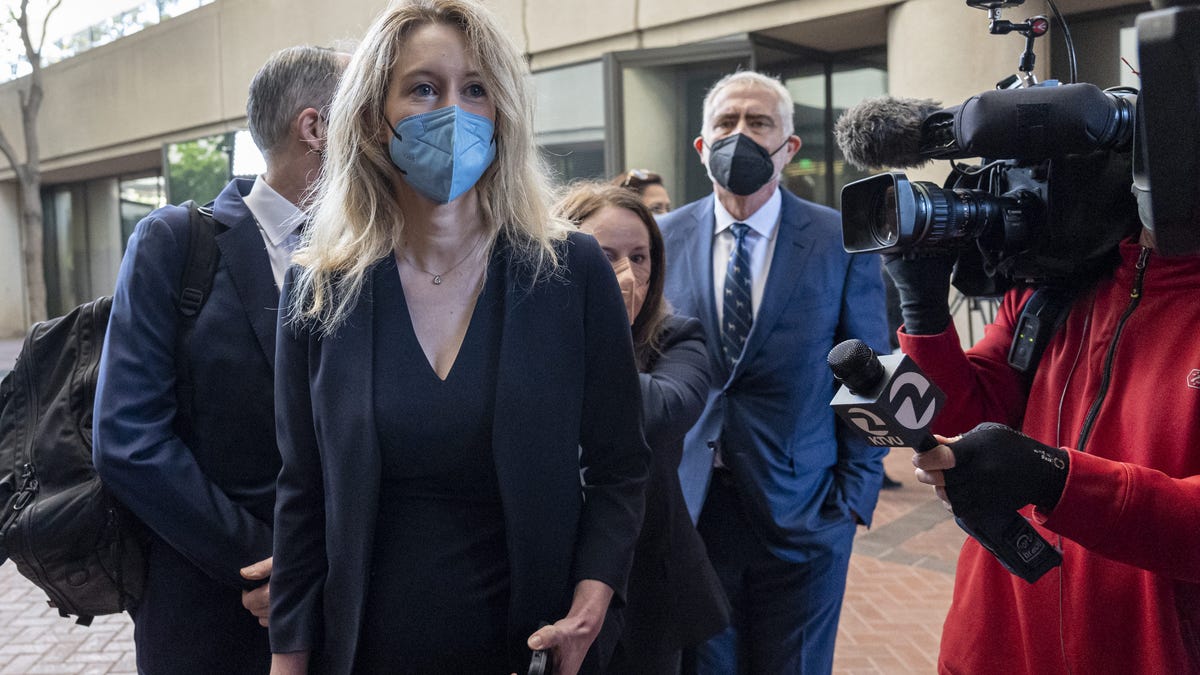 Why You Can Trust CNET
Why You Can Trust CNET Elizabeth Holmes found guilty of defrauding Theranos investors
The verdict is in following a much-watched trial, with the jury finding Holmes guilty on four counts of conspiracy and wire fraud related to the failed blood-testing startup.

Theranos founder Elizabeth Holmes has been found guilty of four counts of conspiracy and wire fraud after originally facing 12 counts.
A jury in federal court found on Monday that Elizabeth Holmes deliberately misled investors in Theranos, the failed startup she founded to revolutionize blood testing. The verdict follows a closely watched trial that stretched over almost four months.
Admirers often compared Holmes to Steve Jobs while she helmed Theranos, and the company she started and ran was worth billions. She will soon face sentencing after being convicted of three counts of wire fraud and one count of conspiracy to commit wire fraud. The jury in US District Judge Edward Davila's court room in San Jose, California, found Holmes not guilty on four charges involving fraud committed against paying Theranos patients.
A masked Holmes, 37, showed no visible reaction as the verdict was read, according to reporters in the courtroom, which NPR described as "eerily quiet."
The verdict was announced after jurors informed the court earlier in the day they were deadlocked on three of the 11 counts facing Holmes. After consulting with attorneys for both sides, Davila instructed jurors to return to deliberations on the undecided counts. A few hours later, no progress had been made and the jury returned a finding of "no verdict" on three additional counts of wire fraud involving investors. A mistrial has been formally declared on those counts, according to a federal court filing released Tuesday, as reported by The New York Times.
Holmes originally faced 12 total charges of conspiracy and fraud. Another charge was thrown out earlier in the trial. Each guilty verdict carries with it a maximum sentence of 20 years for a total of up to 80 years if "stacked" on top of each other, but legal experts say it would be unusual for that to happen in a fraud case.
Origins of Theranos' troubles
After investigations revealed the technology had serious problems, the company quickly went from $9 billion unicorn to one of the decade's more notorious Silicon Valley fails.
Following years of delays due to COVID-19 and the birth of Holmes' child, among other reasons, the proceedings finally got underway in September, with dozens of witnesses called over the course of three months.
In the first phase of the trial, government prosecutors attempted to make the case that Holmes deliberately misled investors and patients that the company was closer to achieving its aims than she knew to be true. In cross-examination and later during Holmes' own lengthy testimony, her defense attorneys countered that she never intentionally misled anyone.
"She believed she was building a technology that would change the world. That's our story," defense lawyer Kevin Downey told the jury, according to The Wall Street Journal.
Holmes also testified that she suffered abuse from her former Theranos business partner and ex-romantic partner Ramesh "Sunny" Balwani. The abuse allegations were not directly connected to the charges against Holmes. Balwani is set to face fraud charges in his own trial in 2022.
Lawyers for Balwani called the abuse allegations "outrageous." He has also pleaded not guilty to the charges against him.
A masked Holmes looks on during legal proceedings in this rendering from a court artist.
What happened to Holmes and Theranos?
In 2003, Holmes dropped out of Stanford University at 19 to found Theranos with the goal of disrupting the blood-testing industry. The company said it was developing proprietary technology that required gathering a smaller amount of blood than a conventional intravenous draw and was more portable than traditional tests sent off to a lab.
Theranos began to see more mainstream attention in 2013 when it signed up Walgreens and Safeway as potential customers. At one point, the startup was valued at more than $9 billion.
Holmes began to appear on the cover of various publications, including Fortune, sometimes drawing comparisons to Steve Jobs for her seeming powers of disruption and a penchant for high-necked black tops.
But the fortunes of both Holmes and Theranos began to change in 2015 when The Wall Street Journal took a deeper look into the company. The Journal reported that only a small portion of tests were being done with the company's testing machine, named Edison, and that many tests were being run on other companies' machines, using diluted blood samples. The accuracy of test results that patients received from Theranos was also called into question.
All this led to the charges filed against Holmes in 2018, a settlement with the Securities and Exchange Commission and the permanent shuttering of Theranos shortly thereafter.
A 2019 documentary, a book called Bad Blood: Secrets and Lies in a Silicon Valley Startup by Wall Street Journal reporter John Carreyrou, and multiple podcasts about the company's precipitous fall helped bring mainstream attention to the story.
Former Theranos employee and whistleblower Tyler Shultz spoke with CNET in 2020 about the whole saga.

